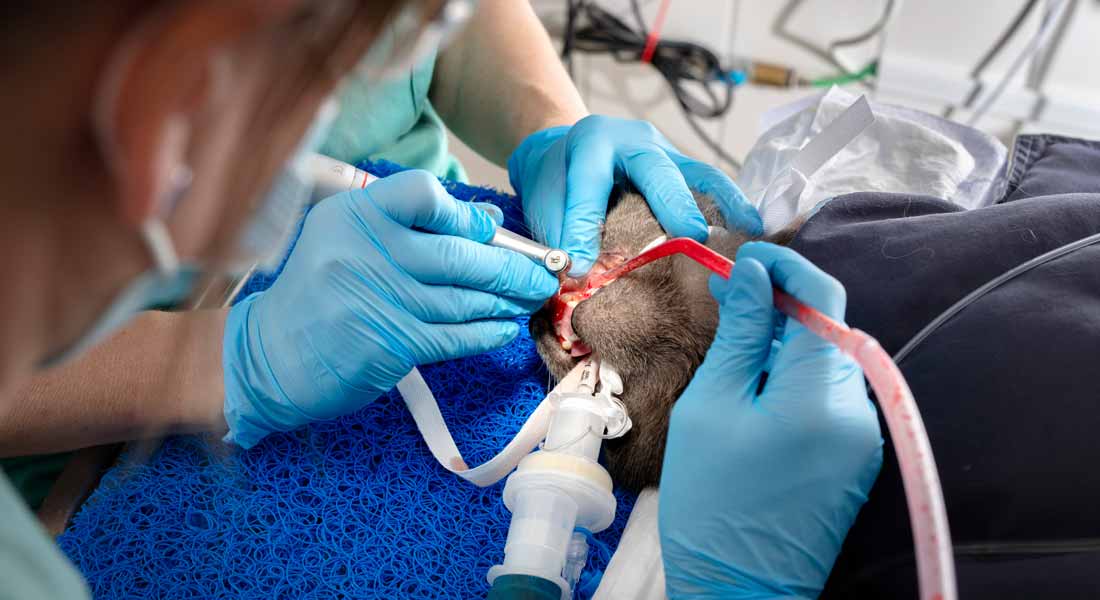Applied Clinical Companion Animal Odontology
This course is a specialisation course at the Master of Companion Animal Clinical Science. The Master is a post graduate education targeted small animal veterinarians seeking Continuing Professional Development (CPD).

The purpose of this course module is to further develop the skills of the student within the discipline of companion animal odontology.
The level of prior knowledge and skills within clinical odontology from both the veterinary candidate level and the first part of the master-education will be developed in order to form a solid platform within clinical odontology.
In theory and by practical exercises, the participant can expect that professional skills and competences within the subject of clinical companion animal odontology will be extended.
The participants’ knowledge, professional skills and competences within clinical odontology will be enhanced through theoretical seminars, practicals and case-based exercises.
The participants will be encouraged to define, identify and discuss clinical methodology, including identification of clinical odontological lesions, and paraclinical tools in systematised reflective clinical decision making in companion animal odontology.
The course will extend the students assessment and management of the complex patient in need of dental and oral care and plan the perioperative management of the patient including special anaesthesia and analgesia requirements.
Read more about the Master of Companion Animal Clinical Science.
Lectures, e-learning, theoretical and practical exercises. Case-study work.
Knowledge
Having completed the course, the student must be able to:
- Define, identify and discuss veterinary methodology and paraclinical tools in systematized reflective clinical decision making in companion animal clinical odontology
- Explain, reflect about and demonstrate overview of complex clinical decision making, patient therapy and management in companion clinical odontology
- List, classify, and demonstrate critical reflection on existing and new approaches to patient diagnosis, therapy, management and client education in a specialty practice situation within odontology.
Skills
Within the area of clinical companion animal odontology the graduate will be able to:
Apply the quantitative and qualitative methodologies and tools as well as master relevant skills within companion animal odontology - especially in periodontology and endodontology.
- Perform clinical and para clinical workup to set a correct diagnosis using especially dental radiography.
- Decision making in regards to choice of treatment options.
- Perform dental prophylactic treatment for periodontal disease
- Perform surgical periodontal treatment including applying advanced surgical technologies.
- Perform non-surgical and surgical tooth extractions.
- Continuously seek out, reflect on and apply new evidence based diagnostic, therapeutic and monitoring approaches incl. the use of systematic critical review of pertinent literature
- Communicate and discuss academic issues with both peers and non-specialists and across disciplines within companion animal odontology practice
- Communicate effectively in writing and pass on results to relevant parties – especially in guidance of clients.
Competences
Following the course, the candidate must be able to:
- Interpret, assess and reflect on collected patient data in order to identify/localize the cause of disease, make clinical decisions, arrive at a diagnosis, apply, and integrate evidence based scientific approaches to plan and administer further diagnostics, patient therapy and management in companion animal patients with common oral diseases especially within periodontology and endodontology.
- Work independently, take responsibility for, predict, prognosticate and make decisions within companion animal clinical odontology.
- Collaborate constructively within and between specialists/professionals and lay persons involved in companion animal odontology patient management.
- Make ethical considerations regarding diagnostic methods and therapies in companion animal clinical odontology and place these into perspective.
- Independently evaluate and structure own learning processes and continuously obtain new knowledge at an advanced level within companion animal odontology
You must meet the following criteria to be admitted to this course:
- Hold a degree in Veterinary Medicine
- Hold one of the following certifications
- DVA Certificate in Small Animal Diseases (equivalent to the 4 compulsory courses of the Master of Companion Animal Clinical Science)
- Swedish / Norwegian / Finnish specialist in diseases of dogs and cats
- Equivalent competences
- Have a minimum of 2 years of relevant work experience from companion animal practice
- Be proficient in English
Find detailed information about the formal requirements for this course.
The course responsibles at the specialisation track in Companion Animal Odontology are:
- Professor Annemarie Thuri Kristensen, Department of Veterinary Clinical Sciences, The Faculty of Health and Medical Sciences, University of Copenhagen, Denmark.
- National specialist and Diplomat Hanne Ellen Kortegaard, Department of Veterinary Clinical Sciences, The Faculty of Health and Medical Sciences, University of Copenhagen, Denmark.
Lecturers: National and international capacities within the field.
Course details
| Duration: | 5 days on campus |
| Dates: | Offered next time fall 2025 |
| Frequency: | Only available every second year |
| Course capacity: | 10 students |
| Place: | University Hospital for Companion Animals, Frederiksberg, Denmark |
| Course fee: | EU/EEA citizens Single course participant: 36,500 DKK Master student: 33,000 DKK Non-EU/EEA citizens Single course participant: 40,740 DKK Master student: 37,240 DKK Tuition fees include course materials and lunch/coffee. Books are not included in the tuition fees and must be purchased by the participants. |
| Level and credit: | Master course; 6 ECTS |
| Examination date: | Please consult the exam schedule |
| Application deadline: | Master's programme: 1 May 2025 Course: September 2025 |
| Admission: | To be admitted, you must meet the admission criteria for specializations at Master of Companion Animal Clinical Science |
The opening of the application period is announced via the programme newsletter.
Download course curriculum
